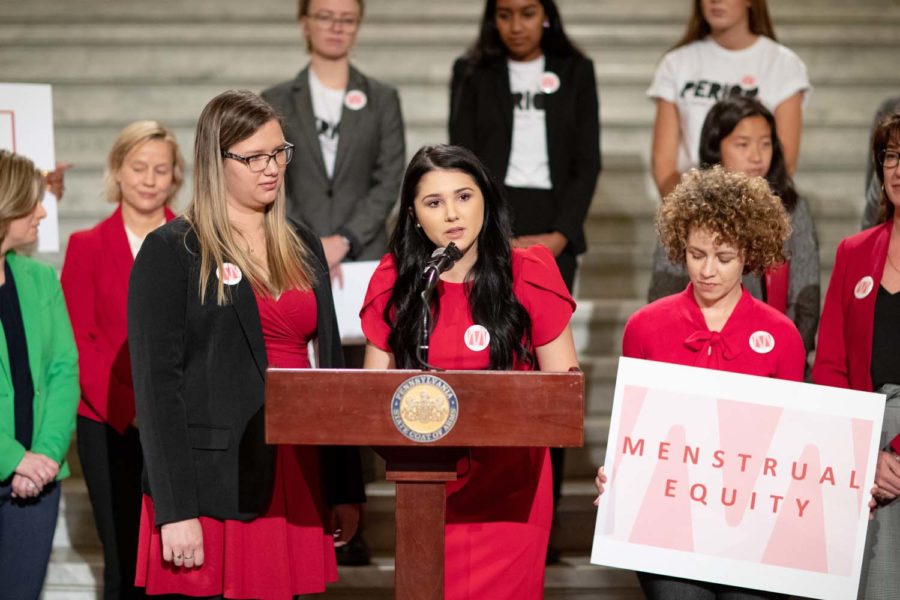Public health students lobby in Harrisburg for menstrual products
Image via Pennsylvania Senate Democrats Flickr
Lauren Risser, Kathleen Koesarie and Samantha Totoni (left to right) speak at Harrisburg on Tuesday to lobby for a bill that would require free menstrual products in Pennsylvania higher education facilities.
October 25, 2019
Pitt students may have noticed new menstrual health product dispensers in women’s bathrooms across Pitt’s campus in September. The dispensers are there because of the efforts of public health graduate students Kathleen Koesarie, Lauren Risser and Samantha Totoni — and the students are not stopping there.
The three of them traveled to Harrisburg Tuesday with State Rep. Sara Innamorato, D-21, to lobby for a bill that would require free menstrual products in Pennsylvania’s higher education facilities.
The students advocated on behalf of Period at Pitt Public Health. They are are working to get co-sponsors, and raising awareness for when the bill — currently in the memo stage — is eventually voted on.
“We lobbied hard all day and hustled to get face-to-face time with representatives,” Koesarie said. “Most of the times we talked to them were by running into them in the hallways and stairwells. The Capitol is organized chaos.”
The three students gave a speech on the House floor about normalizing the words surrounding menstruation in order to fight the stigma. To their surprise, Koesarie said, House Speaker Rep. Mike Turzai, R-28, didn’t use the word “menstrual” when introducing them. Instead, he only mentioned that they were there in support of the bill for product access in middle schools and high schools, and didn’t describe the reason they were there — to advocate for free menstrual products in colleges and universities.
“It’s interesting because the speech we made was about normalizing the words surrounding menstruation — tampons, pads, periods, blood,” Koesarie said. “These are not dirty words and we need to be able to say them comfortably to fight the stigma surrounding this issue.”
Innamorato also called out the omission on Twitter, saying, “If our leaders are ashamed to say the word, how can we end the stigma?”
During the speech, Koesarie, Risser and Totoni also read excerpts from their art project “Your Stories, Period” — a combination of drawings and quotes collected from Pitt students, staff and faculty about their experiences needing menstrual products when they weren’t available. These stories, and other advocacy from the students, helped convince Pitt administrators to implement a campus-wide pilot program in September.
All three graduate students said they were inspired by Martha Terry, a Public Health professor they all shared.
“They knew from comments that I had made in class that this was something that I cared deeply about,” Terry said. “I’ve met with them to strategize on how to talk to administrators, raising it as a human rights issue and a health issue. I see them informally in the hall, and I encourage them to keep up the good work and congratulate them.”
Koesarie, Risser and Totoni weren’t just thinking of menstrual equity on a university scale. They intended to lobby for a federal bill, but Innamorato, inspired by their project, encouraged them to attempt it at the state level first.
“I was really taken by their passion for the work,” Innamorato said. “They were talking about a federal bill, and I was like, ‘Well, why don’t we do something in the state of Pennsylvania?’”
Innamorato said Koesarie, Risser and Totoni were the first people to bring menstrual equity to her attention as something that could be corrected through policy. She compared menstrual products to toilet paper, questioning why one is required by statute in public restrooms and the other — just as essential, according to Innamorato — is not.
“I identify as a woman, and I get a period once a month. So I’m not divorced from the issue, like 51% of the population, I’m aware what that’s like,” Innamorato said. “I think, on the legislative side, it was really brought to my attention by Kathleen, Lauren and Sam.”
In addition to Innamorato, Risser said she and the other grad students have met with U.S. Rep. Mike Doyle, D-18, State Rep. Dan Frankel, D-23, and State Sen. Jay Costa, D-43.
“It can be really intimidating to meet with elected officials, but it has been such an empowering experience and I would encourage everyone to do it,” Risser said in an email.
While some schools have free products, some have dispensers that either don’t work, cost money or stay empty, Koesarie said. And most schools don’t have dispensers at all.
“We believe that no student should miss class because of their period, ” Koesarie said. “We want to standardize the expectations surrounding menstrual products for students via policy change.”
Risser agreed, and said they hope to end period poverty, which she wants to accomplish by having easily accessible menstrual products in schools.
“No one should have to worry if they are bleeding onto a chair during class, decide if they can leave their tampon in for a few hours longer or use toilet paper or a sock until they can find products,” Risser said.



